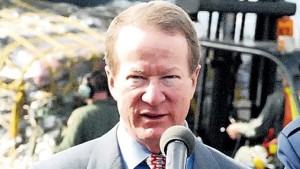
BROWNFIELD… it is a problem that cries out for greater coordination between the governments and states of the Caribbean region and others
WASHINGTON, DC, USA — Cocaine moving through the Caribbean to the United States increased by 400 per cent between 2011 and 2014, raising concerns that the region is regaining its status as a preferred trafficking route as obtained in the 1970s and 1980s.
William Brownfield, assistant secretary of the Bureau of International Narcotics and Law Enforcement Affairs, on Tuesday disclosed that cocaine flowing through the region moved from four per cent of what was consumed in the US in 2011 to 17 per cent last year.
“… And while 17 per cent is obviously a tiny, tiny percentage of the more than 80 per cent that we believe passes through Mexico and Central America, nevertheless, it is an increase of more than 400 per cent in a period of only three years,” Brownfield told journalists at a meeting at the State Department in Washington, DC.
“I suggest to you all… that this is a problem that will get worse before it gets better. It is a problem that cries out for greater co-ordination between the Governments and Atates of the Caribbean region and others of the international community. And it is a problem that calls for an integrated and comprehensive solution that addresses not just efforts against the traffickers themselves, but also stronger institutions, stronger economies that will attack the root causes that make communities and vulnerable people willing to co-operate with organised crime, or willing to purchase their product. And finally, it reminds us all that this is not a Caribbean issue, or a Caribbean problem, it is an issue and a problem that affect the entire world,” said Brownfield, whose INL has about 5,000 employees spread across 70 countries.
Only last year the State Department, in its 2014 International Narcotics Control Strategy Report, said the Caribbean was of deep concern as a transit zone for the trafficking of narcotics. At the time, the report stated that US-bound trafficking of cocaine through the region had increased from five per cent in 2011 to nine per cent in 2012.
Jamaica, the 2014 report said, is a transit point for cocaine trafficked from “South America to North America and other international markets”.
“Factors that contribute to drug trafficking include the country’s convenient geographic position as a waypoint for narcotics trafficked from Latin America; its lengthy, rugged and difficult-to-patrol coastline; a high volume of tourist travel and airline traffic; its status as a major transshipment hub for maritime containerised cargo; inadequate educational and employment opportunities for at-risk youth who engage in crime; and a struggling economy…,” the report stated.
On Tuesday, Brownfield suggested that the Caribbean is again beginning to look attractive to drug traffickers as transit through Mexico and Central America becomes more expensive.
“As they look for alternatives [to the expensive routes] the old networks and the old routes through the Caribbean that were their preferred routes in the 1970s to the 1980s will look more attractive in the years ahead,” Brownfield said.
However, he said that despite the fact that the transit trend is moving in the wrong direction, the co-operation that exists among the US, Jamaica and other Caribbean nations today is moving in the right direction, when compared to the 1980s and 1990s.
“…There are many challenges… [and] I am signalling to everyone here that the trend line is moving in the wrong direction for the Caribbean with the amount of product imported in the United States through the Caribbean,” he said.
“But I would suggest to you that, even under these circumstances, the challenges and the problems that Jamaica and the US have to deal with today in 2015 are far more positive than they were 30 years ago. The dominant crisis of the 1980s in the relationship between the Caribbean and the US is today one of many issues that we are trying to work on together,” Brownfield added, citing programmes like the Caribbean Basin Security Initiative through which the US, Jamaica and other Caribbean nations work together to combat transnational crimes and the narcotics trade.
